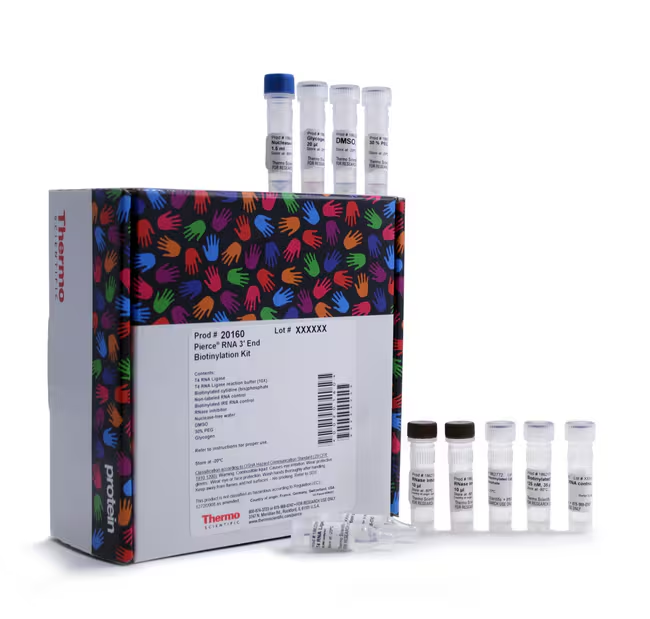
The Thermo Scientific Pierce RNA 3' End Biotinylation Kit is optimized for labeling the 3-prime terminal end of RNA probes to facilitate their use as probes or targets in EMSA and other methods for studying protein-RNA interactions.
Features of the RNA 3' End Biotinylation Kit:
• Non-radioactive—incorporates a biotin label which allows detection sensitivity similar to radioactivity when used with chemiluminescent detection systems
• Fast—RNA can be labeled in 0.5-2 hours with minimal downstream processing
• Easy to use—RNA ligase and optimized reaction buffer are included
• Economical—only a fraction of the cost of purchasing synthetic biotinylated RNA probes
• End-labeled—results in minimal disturbance of RNA secondary structure
• Flexible—label synthetic or in vitro transcribed RNA probes ranging from 22—450 nucleotides
This complete kit contains an unlabeled RNA strand to use as a positive control, a biotinylated-RNA probe standard, RNase inhibitor, glycogen and ligation-enhancing reagents.
The RNA 3' End Biotinylation Kit uses T4 RNA ligase to conjugate a single nucleotide analog to the 3' terminus of an RNA strand. The unique biotinylated cytidine (bis)phosphate used in this kit enables T4 RNA ligase to attach a single biotin tag on RNA probes of diverse secondary structure and lengths with > 70% efficiency.
Labeling reactions performed with the RNA 3' End Biotinylation Kit typically require 50 pmol of RNA and a 20-fold excess of biotinylated nucleotide in a 2 hour reaction at 16°C. Shorter RNA probes with minimal secondary structure can be ligated in 30 minutes at 37°C (e.g., RNA polymerase RNA template). Large or structurally complex RNA probes (e.g., Let-7 and hTR) require longer incubation times. Optimization of biotinylation efficiency for complex RNA molecules is achieved by altering the RNA to biotinylated cytidine ratio, increasing the incubation time or by adding DMSO to the labeling reaction in order to denature the RNA structure.
Following the RNA biotinylation reaction, labeled RNA is easily precipitated to remove reaction byproducts. The biotin label enables the RNA probe to be immobilized or detected with streptavidin in order to study RNA interactions (i.e., RNA electrophoretic mobility shift assays, RNA pull-down assays) or to perform nonradioactive blotting assays (i.e., Northern blotting and miRNA profiling).
| Code | Description |
|---|---|
| 20160 | Catalog Number: 20160 |

